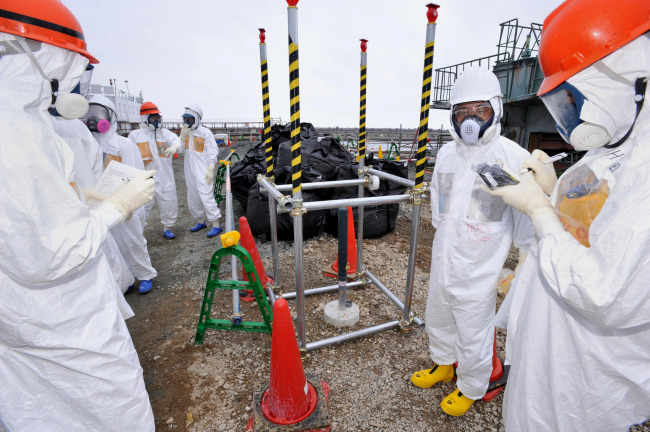Japanese Prime Minister Shinzo Abe indicated that his patience with the operator of the stricken Fukushima nuclear plant had worn out when it ordered his government to help with the clean up.
Tokyo Electric Power Company announced last month that about 300 tons of radioactive groundwater had been flowing into the sea every day. It was criticized for its lack of openness and slowness to report the leaks or the risk of them happening.
 |
Reporters inspect an observation well which is dug to take underground water samples near Fukushima Dai-ichi nuclear plant Unit 1 of Tokyo Electric Power Co., in Okuma, Fukushima prefecture, northeastern Japan. (AP-Yonhap News) |
The announcement added to a growing consensus that TEPCO’s response to the incident had been reluctant, dishonest and irresponsible.
Its lack of progress in the clean-up is an even bigger problem for Abe, who supports the reintroduction of nuclear power to alleviate his country’s power shortage and is under pressure to bring the Fukushima debacle under control.
The water is likely to be from the groundwater being poured into the reactors to prevent a worse disaster. The fuel is still undergoing fission, which gives off heat. If it is not cooled down, the worry is that it will overheat and react, causing a massive release of radioactive materials.
But while this averted a bigger problem, the leaks are still a headache for those involved in the cleanup. If waters rise, those involved say that the flow into the sea will accelerate.
With containment having failed, the only alternative is to pump the water out, but this pumped water has to be put somewhere. The BBC reported Thursday that 1,000 giant storage tanks brought in for the purpose were nearly all full.
Abe described the situation as urgent, but it is not clear whether the leaks pose any significant health threat.
The effect of dilution means the leaks into the ocean are not likely to cause significant problems outside Japan, and the nature and level of health threats along Japan’s eastern coast are not certain.
But even if the threats are marginal, it may not tip the scales of public opinion. The World Health Organization released a report this year assessing the overall health impact of the disaster as marginal ― cancer deaths, for example were estimated to climb by just 0.2 percent. But the public wants more assurance than this, particularly when it seems that the situation at the plant could worsen at any time and a large area of land is still off limits.
If Abe wants to reintroduce nuclear power, he will have to convince the public that the government, if not the companies directly responsible, can deal with an emergency, but more than two years after the disaster, Fukushima is still a chaotic mess.
By Paul Kerry (
paulkerry@heraldcorp.com)








